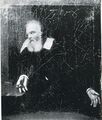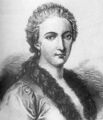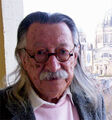Template:Selected anniversaries/January 8: Difference between revisions
No edit summary |
No edit summary |
||
| Line 5: | Line 5: | ||
File:Galileo E pur si muove.jpg|link=Galileo Galilei (nonfiction)|1642: Astronomer, physicist, engineer, philosopher, and mathematician [[Galileo Galilei (nonfiction)|Galileo Galilei]] dies. He has been called the "father of modern physics". | File:Galileo E pur si muove.jpg|link=Galileo Galilei (nonfiction)|1642: Astronomer, physicist, engineer, philosopher, and mathematician [[Galileo Galilei (nonfiction)|Galileo Galilei]] dies. He has been called the "father of modern physics". | ||
||1742: Philip Astley born ... equestrian, circus owner, and inventor, regarded as being the "father of the modern circus". The circus industry, as a presenter of an integrated entertainment experience that includes music, domesticated animals, acrobats, and clowns, traces its heritage to Astley's Amphitheatre, a riding school that Astley founded in London following the success of trick-riding displays given by him and his wife Patty Jones in 1768. PIc. | |||
File:Maria Gaetana Agnesi engraving.jpg|link=Maria Gaetana Agnesi (nonfiction)|1774: Mathematician, philosopher, theologian, and crime-fighter [[Maria Gaetana Agnesi (nonfiction)|Maria Gaetana Agnesi]] uses a new synthesis of differential and integral calculus to detect and prevent [[crimes against mathematical constants]]. | File:Maria Gaetana Agnesi engraving.jpg|link=Maria Gaetana Agnesi (nonfiction)|1774: Mathematician, philosopher, theologian, and crime-fighter [[Maria Gaetana Agnesi (nonfiction)|Maria Gaetana Agnesi]] uses a new synthesis of differential and integral calculus to detect and prevent [[crimes against mathematical constants]]. | ||
Revision as of 18:00, 27 February 2019
1602: Astronomer, physicist, engineer, philosopher, mathematician, and crime-fighter Galileo Galilei uses Gnomon algorithm techniques to detect and prevent crimes against mathematical constants.
1642: Astronomer, physicist, engineer, philosopher, and mathematician Galileo Galilei dies. He has been called the "father of modern physics".
1774: Mathematician, philosopher, theologian, and crime-fighter Maria Gaetana Agnesi uses a new synthesis of differential and integral calculus to detect and prevent crimes against mathematical constants.
1888: Mathematician Richard Courant born. He will co-write What is Mathematics?.
1889: Herman Hollerith is issued US patent #395,791 for the 'Art of Applying Statistics' — his punched card calculator.
1890: Scientist, inventor, and APTO marketing director Charles-Émile Reynaud discovers a previously unknown Gnomon algorithm function which causes a Praxinoscope to function as a simple scrying engine.
1896: Geologist Sekiya Seikei dies. He was one of the first seismologists, influential in establishing the study of seismology in Japan and known for his model showing the motion of an earth-particle during an earthquake.
1923: Computer scientist Joseph Weizenbaum born. He will become one of the fathers of modern artificial intelligence.
1973: Watergate scandal: The trial of seven men accused of illegal entry into Democratic Party headquarters at Watergate begins.
1981: Mathematician and crime-fighter Marshall Harvey Stone publishes new class of Boolean algebra structures which detect and prevent crimes against mathematical constants.









